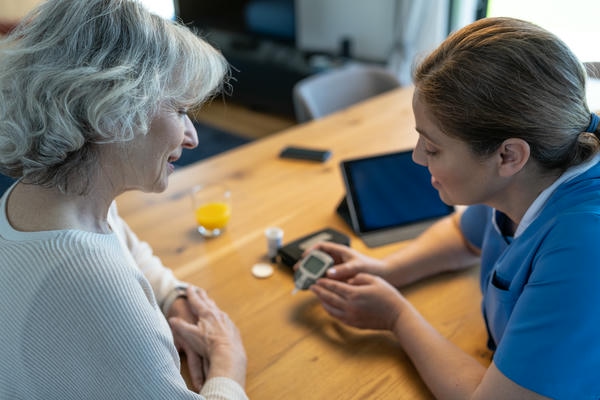Sarah gently knocked on her mother’s bedroom door one morning, carrying a familiar blue kit in her hands. “Time for your blood sugar check, Mom,” she called softly. Inside, her mother Elena sat at the edge of her bed, already waiting with a slight smile. This morning ritual had become their special moment of connection – a daily reminder of their shared journey managing Elena’s type 2 diabetes. As Sarah carefully prepared the glucose meter, she reflected on how far they’d come since her mother’s diagnosis two years ago. What had once seemed like an overwhelming maze of medical terminology, strict schedules, and constant worry had transformed into a manageable routine, strengthening their bond in unexpected ways.
Understanding and Managing Diabetes: A Caregiver’s Journey
The path of diabetes care in Ontario presents unique challenges and opportunities. Our province’s diverse healthcare system offers extensive support, yet navigating these resources while managing daily care responsibilities can feel overwhelming. For the nearly 400,000 family caregivers in Ontario supporting loved ones with diabetes, each day brings new learning experiences and opportunities for growth. Understanding diabetes goes far beyond monitoring blood sugar levels – it’s about embracing a holistic approach to health and well-being that transforms both the caregiver and the person receiving care.
When James first became his father’s primary caregiver in Mississauga, he felt lost amid the complexity of diabetes management. “I remember staring at pages of instructions about insulin dosages, meal timing, and emergency procedures, wondering how I’d ever keep it all straight,” he shares. “But then I realized something important – this wasn’t just about following medical instructions. It was about supporting Dad in maintaining his independence and dignity while ensuring his safety.” This realization marked the beginning of James’s journey toward becoming not just a caregiver but a partner in his father’s health management.
The impact of diabetes extends far beyond physical health, touching every aspect of daily life. For Ontario families, this often means adapting cultural traditions, especially around food and social gatherings, to accommodate diabetes management needs. Take the Singh family in Brampton, for instance. When Mrs. Singh was diagnosed with type 2 diabetes, her daughter Priya faced the challenge of modifying traditional Indian recipes to maintain stable blood sugar levels while preserving the flavors her mother loved. “It became a creative challenge,” Priya explains. “We discovered ways to make her favorite dishes diabetes-friendly, turning our cooking sessions into opportunities for bonding and learning together.”
The Daily Rhythm of Diabetes Care
Establishing a consistent care routine while maintaining flexibility for life’s uncertainties becomes an art form for caregivers. Morning often begins before sunrise, with careful attention to medication timing and breakfast planning. For type 1 diabetes management, this might mean calculating insulin doses based on planned activities and anticipated meals. For type 2 diabetes, it could involve organizing oral medications and preparing balanced meals that help maintain stable blood sugar levels throughout the day.
Toronto-based diabetes educator Maria Rodriguez emphasizes the importance of understanding the “why” behind each care task. “When caregivers understand how different factors affect blood sugar levels, they can make more informed decisions throughout the day,” she explains. “It’s not just about following a checklist – it’s about developing an intuition for diabetes management that allows for both structure and flexibility.” This knowledge becomes particularly crucial during special occasions or unexpected events, when routine adjustments become necessary.
The emotional aspect of diabetes care often goes unacknowledged but remains critically important. Caregivers frequently find themselves providing psychological support, helping their loved ones navigate the frustration of dietary restrictions, the anxiety of potential complications, and sometimes the depression that can accompany chronic illness management. Creating space for open dialogue about these challenges while maintaining a positive outlook becomes an essential skill for successful long-term care.
Building a Support Network and Accessing Resources
Ontario’s healthcare system offers numerous resources for diabetes management, but knowing how to access and utilize them effectively makes all the difference. Local Diabetes Education Centers, found in communities across the province, provide invaluable support through educational programs, counseling services, and connections to healthcare professionals. Many of these centers offer specialized programs for different cultural communities, recognizing the importance of culturally appropriate care approaches.
The Ontario Caregiver Organization provides specific support for family caregivers, including peer support groups and respite care options. These resources become lifelines during challenging times, offering both practical assistance and emotional support. Linda, a caregiver from Ottawa, shares how joining a support group transformed her experience: “Meeting other caregivers helped me realize I wasn’t alone in my struggles. We share tips, celebrate successes, and support each other through difficult days. It’s become my second family.”
Technology plays an increasingly important role in diabetes management, with numerous apps and devices available to assist caregivers. Continuous glucose monitoring systems, digital medication reminders, and telehealth services have revolutionized how care is delivered and monitored. However, the human touch remains irreplaceable. As George, a caregiver from Hamilton, notes, “The apps and devices are incredibly helpful, but they’re tools to support our care, not replace it. The real magic happens in those daily interactions, understanding subtle changes in mood or behavior that might indicate something needs attention.”
Nurturing the Caregiver-Care Recipient Relationship
The relationship between caregiver and care recipient often evolves in beautiful and unexpected ways through the journey of diabetes management. What begins as a practical arrangement of monitoring and assistance can transform into a deeper connection built on mutual trust and understanding. This evolution requires patience, empathy, and the ability to maintain boundaries while providing compassionate care.
Communication becomes an art form in itself. Learning to discuss health concerns without causing anxiety, encouraging healthy choices without seeming controlling, and celebrating progress without minimizing challenges – these skills develop over time through practice and reflection. The goal is to foster independence while ensuring safety, a delicate balance that requires constant adjustment based on changing needs and circumstances.
For Ontario caregivers, seasonal changes bring additional considerations in diabetes management. Winter’s limited outdoor activity options and holiday celebrations can impact blood sugar control, while summer heat and increased activity levels present different challenges. Successful caregivers learn to anticipate these variations and adapt their support strategies accordingly, always maintaining flexibility while ensuring consistent care.
Looking Forward: Evolving Care Approaches
As our understanding of diabetes management continues to evolve, so too do the opportunities for enhanced care and support. Research into new treatment options, improved monitoring technologies, and better understanding of lifestyle factors offers hope for easier management in the future. However, the fundamental aspects of caring – compassion, patience, and dedication – remain constant.
For caregivers beginning this journey, remember that expertise develops gradually through daily experience. Every challenge overcome and every successful adaptation of care becomes part of your growing knowledge base. The most successful caregivers maintain their own well-being while caring for others, recognizing that self-care isn’t selfish but essential for sustainable care provision.





